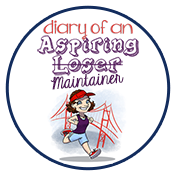Helloooo out there! Yes, I'm still here, training and prepping for the Santa Cruz Triathlon. It's now a mere 8 days away. I'm as ready as I'll ever be. Nothing much to be done now except for a bike and run this weekend and a taper next week.
This past week I hit the gym twice early in the week, including strength training sessions. The weight lifting has taken a serious hit these past few weeks, which I don't like. I love my hard earned muscles and I want to keep them. But with increased tri mileage something had to give. The end of the week was a dud. I was in all-day clinical trainings in San Francisco on Thursday and Friday and that, coupled with the commute home in f-ed up traffic left no exercise time. I tried to be creative and maybe workout in the hotel fitness center (my training was held in a hotel conference room) but that didn't work out. I hope to make up for that a bit this weekend.
 |
| Some notes from the training |
The most frustrating behavior for me lately has been the evening snacking. You know all about it - the dinner rolls, the cereal, etc - and it's still driving me batty. The age old question persists, why can't I seem to stop? I don't want to be doing it, or at least it seems I don't want to be, obviously there's a moment where I do want to be doing it because I do it. But I regret it later. And telling myself I'm going to regret it later doesn't stop it. Reminding myself that I will feel badly about it later isn't stopping me. Nor is the risk of weight gain.
So during the training we had to role-play a problem behavior we wanted to change and mine was evening snacking. I teamed up with another therapist, Vanessa, for the role-play. For the purposes of this assignment, my criteria of "problem behavior" are:
- It's after dinner.
- I'm not hungry OR
- I'm hungry but I choose "bad" foods not on my normal eating plan and/or overeat in response to that hunger.
- My food choices leave me with regret and disappointment.
I long ago figured out that the Why part is not very important, and often doesn't help us to change. Who the heck knows Why, and while answering Why can be interesting and entertaining, it's not necessary for behavior change to occur. So let's set Why aside and look at the more important question, HOW. The question becomes, How do I keep doing this? The answer to that question can help me to change.
So Vanessa and I role-played my issue, creating a chain of behavior to better understand the problem. We also considered vulnerability factors, things that might have weakened my resolve and made me vulnerable to the unwanted behavior (snacking). We took the last time I engaged in this behavior, Thursday evening, and broke down the chain...
The setting: I was home, it was after dinner, I was not hungry. Vulnerability factors: I was tired, the kids were being super-whiny. The behavior chain:
- I went into the kitchen
- I had the urge to snack
- I told myself, "It will be different this time, I won't regret this later"or "This time it's worth it, it's worth the bad feeling." (Lies, all lies).
- I got a dinner roll, put butter on it, and ate it.
So we did the role-play and...
- We learned something: that what I've been assuming is a negative consequence - the bad feeling later - is not bad enough. Why not? It's too far in the future and I've gotten really good at managing that bad feeling. I wake up, feel bad, and then immediately move into, "What's done is done, move on, start a new day making better choices and you'll feel better soon," which is true and a VERY important skill on this journey. But that skill is also doing some harm here. I'm managing the consequence so well that it's no longer an effective consequence. Interesting! The other negative consequence - potential weight gain - is too far in the future and also not guaranteed. In fact, I can often get away with this behavior and not gain weight (or at least not much) by cracking down on myself later. Again, I've gotten good at managing away the consequences.
- We implemented a new rule: I'm no longer allowed to believe that I won't feel bad later. I'm no longer allowed to believe that this snack is worth the bad feeling. Both of those thoughts are not true and listening to them has been part of the problem.
- I need a larger consequence...
If I snack after dinner (as defined above) I will...
-
Not allow myself to get online afterward.Not negative enough. -
Not allow myself to exercise the following day.Self-defeating and just plain crazy. Not allow myself to have my favorite breakfast the next day.Not negative enough.- Write a behavioral chain analysis and post it on my blog's Facebook page. Bam!
So I came up with a plan where every morning Michelle will text and ask me if I snacked the night before. If I tell her "yes" then she will tell me to write my behavior chain analysis, which I will do and then post on Facebook. Ugh, I do not want to be writing/posting behavior chain analyses, which makes it a very good consequence. It also has the secondary consequence of having to tell Michelle. By itself that's not a bad consequence, but if I were to have to tell her again and again that I snacked, it would become a negative consequence because I'd be embarrassed.
And it's working! Last night I went out to dinner with some tri friends. I had a nice dinner and a couple glasses of wine and drove home feeling satisfied (ie - not hungry at all). At some point I decided something like a dessert would be nice and I drove to 7-eleven to buy a candy bar. I pulled into the parking lot and then thought, "Wait, is this an evening snack?" I really wanted to believe it was not but I took a look at the criteria. Is it after dinner? Yes. Was I hungry? No. Would I regret it later? Probably.
Dessert would normally be allowed but I had to admit to myself that this really wasn't dessert, that really, it was an evening snack disguised as dessert. So then I moved to, "Do I have to start now? I just made the plan today, maybe I should start it tomorrow." Phooey bullshit lies. Start now. Besides, I know Michelle is going to text me in the morning, am I going to make up a lame excuse like, "Oh, I meant to start today, last night doesn't count." So I put my car into reverse and drove my butt home. When I got home Marek told me they saved a cookie from their dinner for me. I decided a few bites of cookie was a more legitimate dessert and that I would feel good about that choice in the morning. So I had that, and I was right, I do feel good about it today.
When I received Michelle's text this morning, "Did you snack last night?" I was able to answer No. With a :) to express my good feeling. It's working! So if you follow my Facebook page, and you see a behavior chain analysis on evening snacking, you'll know why.
And, by the way, Vanessa's issue was wanting to exercise more. We role-played her issue and came up with an excellent plan. I think this technique will be VERY helpful in working with clients in my private practice. I love the synthesis of my own experience and my clinical work!!
---------------------------------
I am a licensed clinical social worker with a private practice offering Cognitive Behavior Therapy (CBT) for weight loss and maintenance. I have an office in Marin County, CA and I'm also available to see people via Skype. To learn more please visit my professional website at www.michellefunez.com or email me at funez.michelle@gmail.com



















this is like taking dialectical behavior therapy (something i underwent last year to help with my out of control binge eating) up to the next level. i like it!
ReplyDeleteThat's exactly what it is! Powerful stuff, as I'm sure I don't have to tell you.
Deleteamazing i like it :)
ReplyDelete